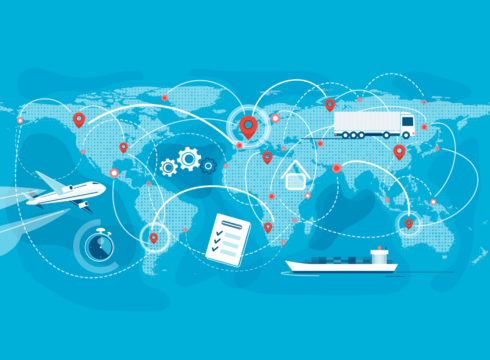With rising fuel prices, a shortage of qualified drivers and various other challenges, it is essential for the trucking community to find ways to optimise routes
Advanced technology-driven logistics platforms employing sophisticated algorithms and AI make it possible for truckers to constantly reap the benefits of route optimisation
Investments in building world-class road infrastructure and focused policy efforts supporting such tech-enabling community platforms will go a long way in creating ease of doing business for the Indian trucking community
Inc42 Daily Brief
Stay Ahead With Daily News & Analysis on India’s Tech & Startup Economy
Logistics is a cost and resource-intensive industry. With rising fuel prices, a shortage of qualified drivers and various other challenges, it is essential for the trucking community to find ways to optimise routes.
Optimisation of routes is the process through which truckers are able to decide which route would cut down the transit time, optimise operating costs, and lead to safer and faster deliveries. There are multiple variables that transporters need to consider such as the vehicle capacity, weight of cargo, congestion on the routes, weather and vehicle condition to name a few.
Typically, you might think that the shortest route or the fastest delivery speed is the most optimised, but it is not always the case. The key lies in determining a route that reduces drive time, fuel consumption, and other costs and risks. In India, the trucking community is by and large unorganised and is dominated by SMEs and individual lorry owners.
Moreover, the tendency among drivers is to opt for tried and tested routes which, in most cases, are not optimal choices. This is simply because it is humanly not possible for transport managers to accurately factor in all the elements that can affect a route’s performance. Even if someone tried, it would take them a long time to consistently come up with optimal route planning for every shipment which would be detrimental to timely deliveries.
However, advanced technology-driven logistics platforms employing sophisticated algorithms and AI make it possible for truckers to constantly reap the benefits of route optimisation.
Benefits Of Route Optimisation
- Faster delivery timelines: Route optimisation reduces on-road time and therefore, improves delivery timelines. Today, there is a need for transporters to ensure quick deliveries across the country. This is where advanced route optimisation tools can help in reviewing the entire delivery process and improve efficiency.
- Economical operations: When efficient technology-driven route optimisation is undertaken, there are fewer hassles such as frequent breaks and fewer diversions. Thus, vehicle owners are able to operate optimally without the risk of over-speeding. This improves the overall mileage and reduces the expenditure on fuel.
- Greater customer satisfaction: Logistics is becoming increasingly competitive, and shippers are now more demanding when it comes to speed of delivery, the safety of cargo, and hassle-free pickups and drop-offs. This is where technology-driven logistics platforms can empower even small-scale truckers to offer features such as real-time tracking, visibility of delivery schedules, digital communication, online payments, feedback, and ratings. Thus, there is greater brand building for truckers and greater confidence and satisfaction among their customers.
- Reducing human errors: Manual route planning is error-prone. Even the most experienced route planner cannot predict traffic jams due to vehicle breakdowns and other unavoidable circumstances. However, with GPS and digital maps, such challenges can be overcome. This leads to improvement in efficiency and reduces the likelihood of human error.
- Real-time visibility: Integration of GPS and maps that illustrate the routes for the driver enables managers to keep an eye on the real-time location and movement of vehicles, keeping the cargo safe. They can also keep a track of speed and time spent on halts to ensure hindrance-free operations.
- Better vehicle maintenance: Route optimisation reduces drive-time, and with safer as well as regulated driving, there is a reduction of wear and tear of the vehicles. Also, with better route planning and access to a mechanic, spare parts replacement can be done in a timely manner, reducing delays.
- Reduced accident risk: As per the Ministry of Transport and Highways’ data from 2019, India ranked first in the number of road accident deaths across 199 countries and accounts for almost 11% of the accident-related deaths in the world. The truck/ lorry category has the third highest share (12.3%) of total crashes, while trucks and lorries accounted for 5.4% of the fatalities in 2020. With better route optimisation, physical challenges that drivers face like tension, anxiety, and exhaustion due to poor road conditions, stress-inducing factors such as traffic jams and roadblocks, can be avoided. With well-defined routes, there are fewer chances of confusion or driver tiredness, which lowers the risk of an accident.
- Better access to emergency services: Even if accidents occur due to mechanical failures, the weather, natural calamities and other reasons, the safety of the driver and the load transported can be achieved with timely access to trauma care hospitals and road assistance services on the planned routes.
The Way Ahead
The use of technology to optimise routes, reduce costs and deliver a smoother and more economical experience to shippers separates winners from the also-runs. Even if a trucking operator doesn’t have large enough fleets or financial resources to deploy captive technology infrastructure, the emergence of digital logistics communities enables everyone to reap the benefits.
Such community platforms allow for access to the latest AI-powered demand-supply matchmaking solutions with timely return load booking, helping in optimising trucking operations and increasing profitability for transport businesses. Recent developments in the logistics sector, including investments in building world-class road infrastructure and focused policy efforts, supporting such tech-enabling community platforms, will go a long way in creating ease of doing business for the Indian trucking community.
{{#name}}{{name}}{{/name}}{{^name}}-{{/name}}
{{#description}}{{description}}...{{/description}}{{^description}}-{{/description}}
Note: We at Inc42 take our ethics very seriously. More information about it can be found here.


